For no apparent reason, I have pitted (often unrelated) things against each other since I was a child. Well, probably for deeply disturbing psychological reasons. Sega had to be universally better than Nintendo, chocolate better than vanilla, coffee better than tea, and orange juice with pulp truer to nature than that pulp-free orange water drink. No Country for Old Men is a better movie than There Will Be Blood, and Shenmue is just superior to Yakuza. In a weird variant of this psychosis, I once told a friend that Meshuggah should be a melodic metal band like the other bands from Sweden and not whatever rhythm based, incorrect metal they were. Lines must be drawn and sides must be taken, damn it.
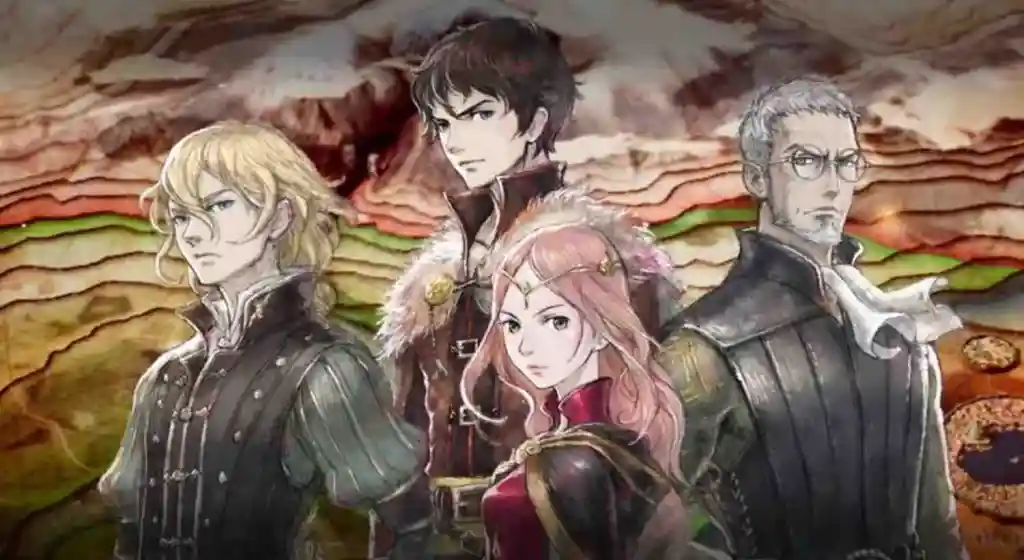
It is in this spirit I bring you a comparison between Fire Emblem: Three Houses and Triangle Strategy. Both are SRPGs (tactical RPGs according to Chris, who has chosen different battles to fight than I) on the Switch. Both tell grand stories and are something of a throwback (one of them deliberately, the other because it kind of just looks shitty). And most importantly, both have been played by me. To the subheadings!
Plot
Triangle Strategy has a less stupid plot than Three Houses. It is more grounded and the focus is on politics and not magic, monsters, and seals. The game tackles some heavy topics like slavery in a not-completely-embarassing way. Fire Emblem’s plot left no mark on me beyond it being cool to see how things play out from three different perspectives. Shining Force III, it is not, however. Not that I have any idea what happens in those games.
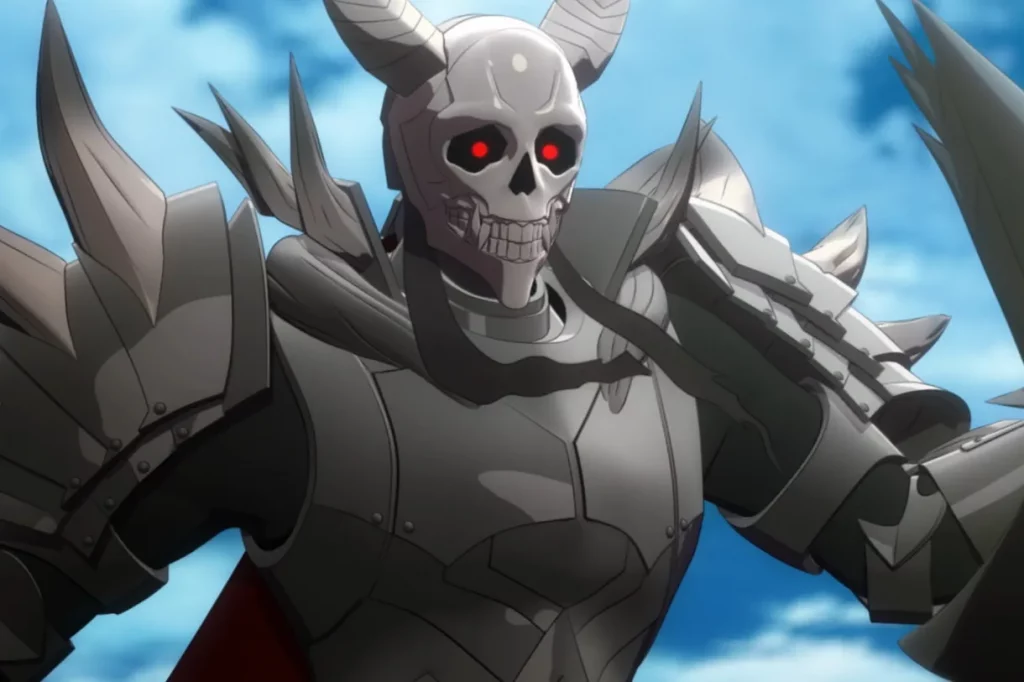
In Triangle Strategy, you do not play some savior/deity character, and at no point do you fight anything resembling god or the creator, which is refreshing for a JRPG. The guy you do play as is basically a wooden stereotype of a lordly gentleman, unfortunately, making the noble and honorable choice at every opportunity. Though typical in this genre and found in Three Houses, it’s disappointing for Triangle Strategy because the other high ranking characters, generally your adversaries, realistically cling to power however necessary, morality be damned. Even the king of the apparently “good” democracy stand-in nation is not a naive, pure of heart chump, but rather seems to understand sometimes things are grey and to hold power you may have to do bad things.
The exploration/clue finding scenes in Triangle Strategy are simplistic but enjoyable and remind me of perhaps the best part of the original Witcher game: solving a crime in a somewhat nonlinear fashion. Comparatively, running around your castle campus for the 50th time with a walkthrough open so you can give the right items to the right characters in Three Houses is tedious.
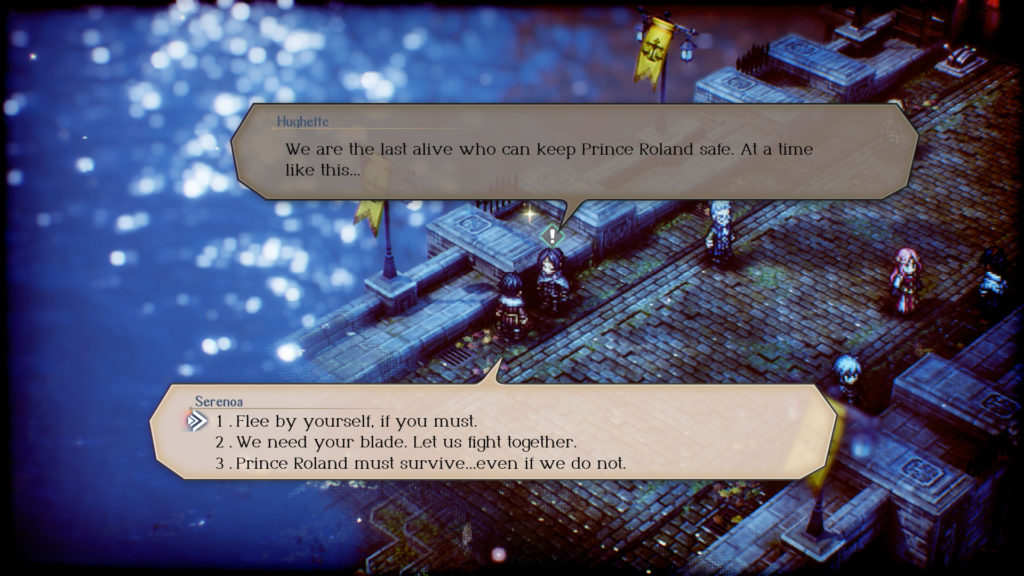
The voting system, in which everyone in your party casts a vote to determine the next path of action, and the quasi non-linearity of Triangle Strategy are neat and tie in nicely to the exploration scenes. Well, really they exist almost entirely to allow the voting mechanics to work – talking to people is how you get information which can then later be used to convince party members to vote a specific way. I was disheartened to learn that the plot branching doesn’t entirely lock you out of places, but instead you just go to maps sooner or later. Still, some semblance of control trumps Three Houses’ single decision offered to the player after providing barely any information on the factions.
Characters
Characterization of your teammates in Triangle Strategy is done through back story cut-scenes. Three Houses characters are more two dimensional and tend to rely on a character trait and preference for depth (I like to paint and am smart, I like horses but am shy, I like flowers and am loud). Simplistic as they may be, actively being the person who draws out more info from your party in Fire Emblem is cooler than flashback cut-scenes with narrative dumps.
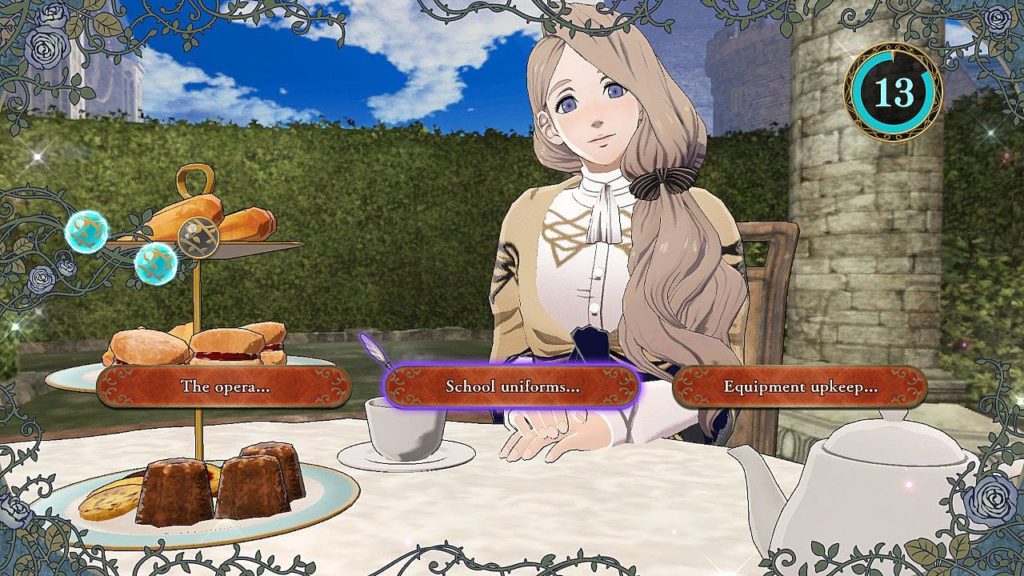
Three Houses continues the series degenerate pandering otaku bullshit that people like me predicted would doom it and similar RPGs into obscurity. As series lose appeal, they desperately cater more and more to nerdy perverts, thus further alienating normal humans with typical sexual desires. Well, this was completely wrong and Fire Emblem has grown in popularity and now offers the chance to stare at your companions during a tea ceremony in a decidedly creepy way. Ally petting, a feature from a prior game, did not make it into Three Houses, so I suppose progress is possible.
Combat
Neither Triangle Strategy nor Three Houses has outstanding combat. Three Houses is weak for the series; many older Fire Emblems have combat significantly more engaging than either game. Unfortunately, the bloat of Three Houses distracts from the battles and seems to have also distracted the designers. The loss of the weapon triangle and the many abilities your characters get, dilute the purity and elegance of a better Fire Emblem entry. It took 18 years, but at least Intelligent Systems and company finally caught up to Langrisser 1 by including troops surrounding each playable character.
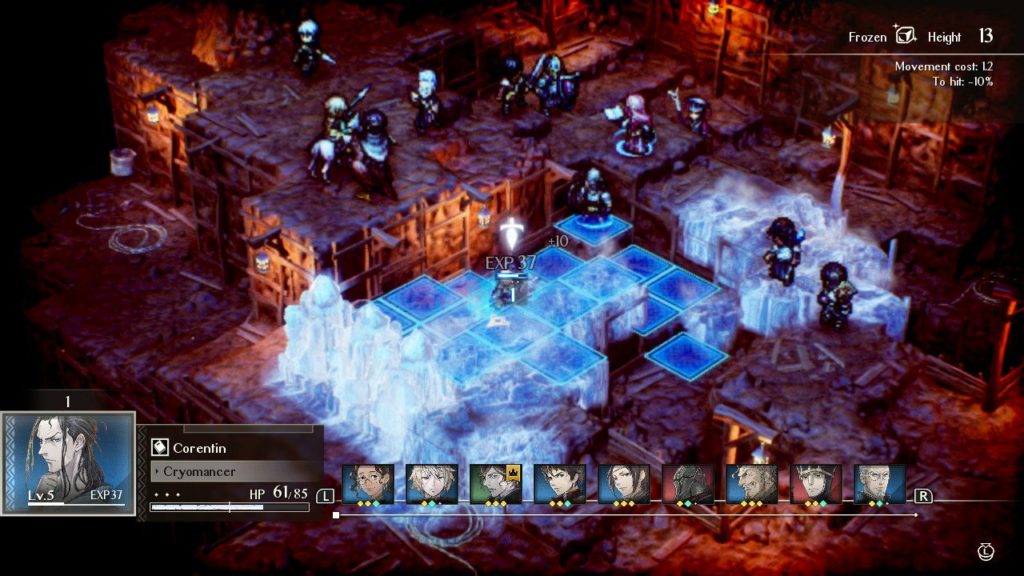
Triangle Strategy seems a little too loosely balanced. Leveling whenever you’d like with mock battles breaks the difficulty curve, which the Fire Emblem series figured out long ago and created the coliseum as a way to offer leveling with significant risk. In Triangle Strategy battles, I never checked what abilities enemies had, either because the game isn’t that hard or because there is no penalty for losing, not even the almost ubiquitous penalty of games – you lose your progress since last save. Losing a battle forces you to replay it but you retain your experience so redoing battles after losing is basically also a way to grind.
Triangle Strategy has only human enemies, which is good in terms of story and mood. It does, however, mean that fights often feel repetitive. The environmental effects, such as lighting squares on fire or covering them in ice, is a nice idea if not a clear nod to the excellent Original Sin series, but these effects don’t ultimately do much in combat. Perhaps they should’ve been more dramatic or simply cut.
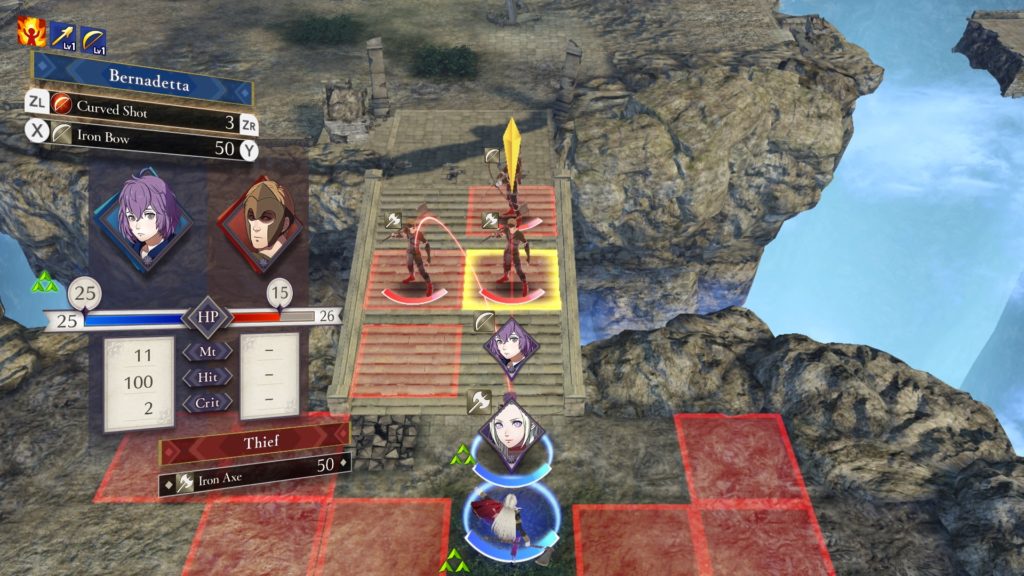
Each character has a unique ability in Triangle Strategy, which is reminiscent of old, good JRPGs like Final Fantasy VI. This, like the other somewhat bold ideas in the design, has its ups and downs. Getting a new character often means you have a new mechanic to play with or at least a twist on an existing gameplay mechanic. Allies are also distinct and distinguishable by more than their art and personality. The downside is there are some people you will just rarely want to use. Giving a guy ladders as a special ability is funny and interesting, but 99% of the time it’s just easier to take longer to get to a location with a superior fighter than waste a team slot on Chester McLadders.
Numbers Going Up
It’s a tie here – Fire Emblem puts a huge emphasis on meters going up with its Persona-inspired school setup. Large chunks of your playtime are dedicated to making sure these relationship meters are moving. Then there are weapon/ability meters to manage.
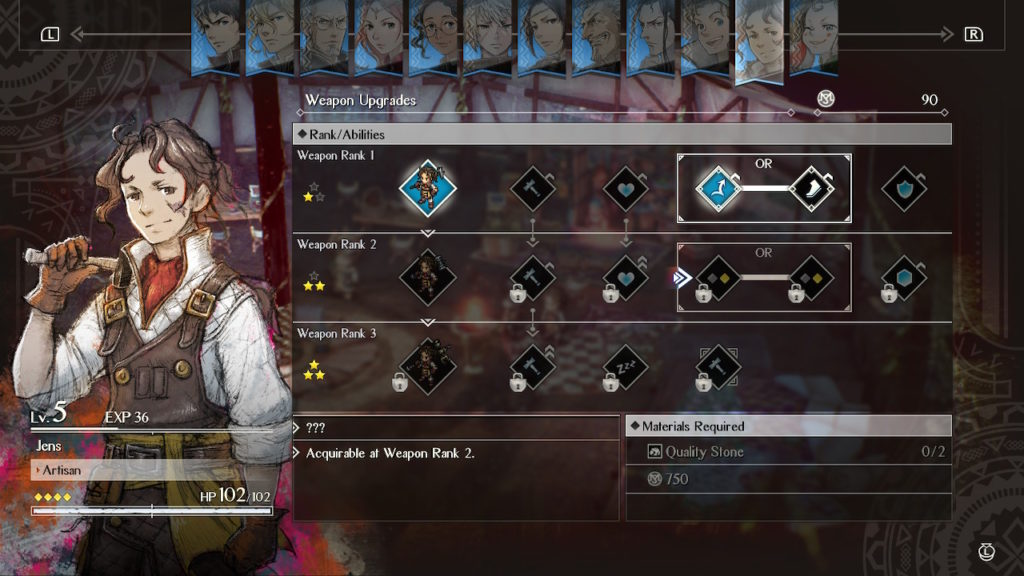
Triangle Strategy has three competing ideals with choices you make adding points to one of them, characters you bond with by bringing them to battle, weapons to improve, and class promotions. There are as many numbers if not more in this game and moving the meters is less tedious. So if you are me from ten years ago, this is the better game for numbers going up. If you are me today, and the last time I checked you weren’t, then maybe Triangle Strategy goes overboard and we get enough of watching numbers from seeing our retirement portfolios drop.
Presentation
This is largely up to personal taste, as opposed to everything else here which is based on objective fact and has been scientifically determined using space age polymers. Triangle Strategy has better 2D graphics than Three Houses has 3D graphics, which may be a thing that makes sense to say. I don’t remember much about either games’ soundtracks other than I aggressively disliked one or two tracks from Triangle Strategy, which was unexpected.
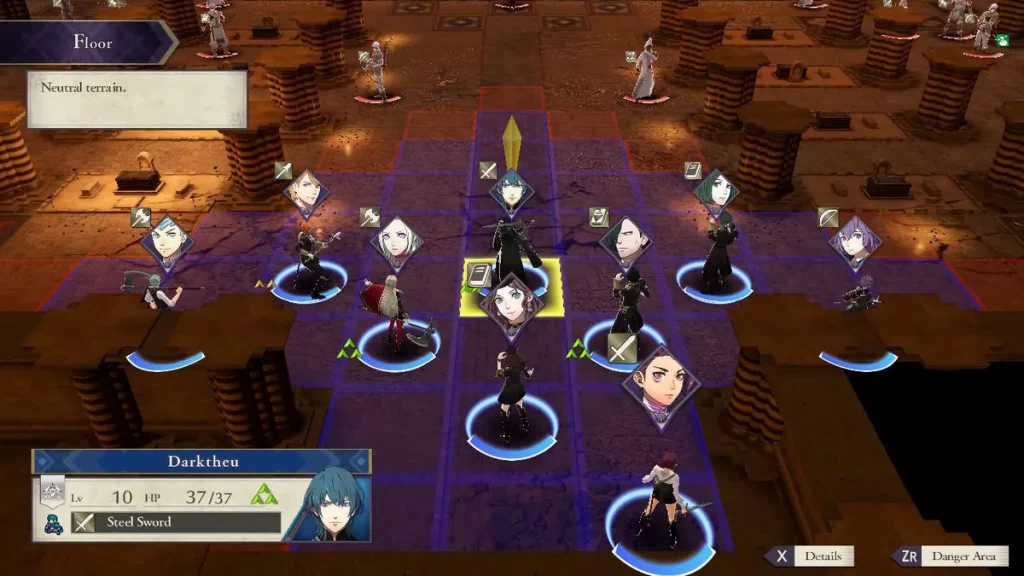
Based on these typical game review categories that are easily understood by those seeking less interesting writing (bookmark this site, I frequently generate uninteresting writing), we can see Triangle Strategy is the superior video game. Maybe I am coming down harder on Three Houses because I am a hack and want to make this post more interesting. I think a lot of distance from it and playing something else vaguely similar has made me see its flaws more clearly.
The truth is I put in dozens of hours and despite being aware of all of the problems I’ve enumerated here, I enjoyed the game and only stopped my second playthrough midway because my wife decided to try Animal Crossing. Triangle Strategy is the better game for the right person, that is true regardless of attempts at clickbait. It feels different enough from similar SRPGs and at this point of advancing age, I really am a sucker for a story that isn’t about the fate of the world, an ancient evil, or a reincarnated savior.
If you like the genre, have a hundred plus bucks, and 150 hours, just play both games. They’re both expensive distractions from the fact that Camelot will never make another Shining Force, and often that’s what I, and 172 other people, need.


I’ll say the same thing I did in my review of Ys IX – the pandering to these subcultures may seem like a good idea in the short term, since they’ll buy pretty much whatever you throw at them. But they’re a fickle bunch, and if you piss them off too many times, they’ll leave you for dead.
But by the time that happens, your older, earlier fans will have moved on. Even if you let the series go back to its roots, they may not come back and give you the time of day.
I think the real problem here is one of branding. There’s nothing stopping these studios from making their otaku bait games as a separate series, or even a spinoff sublabel – except for the fact that they want to commandeer the brand name of an existing, beloved series. And then they run it into the ground, and find some reason to blame consumers.
So it goes.
I do think the otaku pandering has clearly paid off for Nintendo in the specific case of Fire Emblem. The series was nearly dead when Awakening came out and since then it’s only gotten bigger. Somehow the games managed to appeal to normal horny gamers who are a notch or two less pathetic than people playing Vita action RPGs about increasing your breast size.
[…] and not corporations. Sega does not make Shin Megami Tensei games, Nintendo doesn’t make Fire Emblems, Tencent doesn’t make Dark Souls, and I don’t make […]